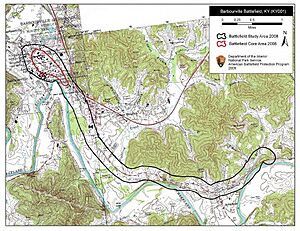Battle of Barbourville facts for kids
Quick facts for kids Battle of Barbourville |
|||||||
|---|---|---|---|---|---|---|---|
| Part of the American Civil War | |||||||
|
|||||||
| Belligerents | |||||||
| Commanders and leaders | |||||||
| Isaac J. Black | Felix Zollicoffer, Joel A. Battle, commanding engaged detachment |
||||||
| Strength | |||||||
| 300 Home Guardsmen | 800 men engaged | ||||||
| Casualties and losses | |||||||
| 1 dead 1 wounded 13 captured |
7 dead | ||||||
The Battle of Barbourville was an early fight in the American Civil War. It happened on September 19, 1861, in Knox County, Kentucky. This battle was part of the Kentucky Confederate Offensive. It was the first win for the Confederate side in Kentucky. This victory worried Union leaders, who quickly sent more troops to central Kentucky. They wanted to stop the Confederate advance, which was finally halted at the Battle of Camp Wildcat in October.
Contents
Kentucky and the Civil War
Kentucky's Neutral Stance
When the American Civil War began in April 1861, President Abraham Lincoln asked states still in the Union to send soldiers. They were needed to stop the states that had left the Union. Kentucky's Governor, Beriah Magoffin, refused to send troops. However, most lawmakers in Kentucky wanted to stay with the Union. So, Kentucky did not leave the Union.
On May 16, Kentucky's lawmakers suggested the state stay neutral. This meant they would not pick a side in the war. Governor Magoffin agreed on May 20. In August 1861, Kentucky voters chose many pro-Union lawmakers. This made it clear Kentucky would stay with the Union. On September 2, the U.S. flag was raised over the Kentucky State Capitol in Frankfort, Kentucky.
Confederate Advance into Kentucky
On September 3, 1861, Confederate Major General Leonidas Polk ordered his troops to take Columbus, Kentucky. This town was important because it was on the Mississippi River. This action ended Kentucky's neutrality. Soon after, Union Brigadier General Ulysses S. Grant took Paducah, Kentucky. Other military moves by both sides quickly followed in Kentucky.
Confederate Brigadier General Felix Zollicoffer led his soldiers from Tennessee. He wanted to move through the Cumberland Gap into central Kentucky. This area was important because it was a border state between the North and South. On September 14, Zollicoffer's 5,400 men reached the Cumberland Gap. They then moved to Cumberland Ford, near Pineville, Kentucky. They aimed to stop Union supporters in the area.
Union supporters had a training camp called Camp Andrew Johnson. It was near Barbourville, Kentucky. Zollicoffer wanted to capture this camp. He also wanted to help another Confederate army led by Albert Sidney Johnston. By attacking Kentucky, Zollicoffer hoped to pull Union troops away from Johnston.
The Battle of Barbourville
On September 19, 1861, a thick fog covered the area. Zollicoffer sent about 800 men forward. These troops were led by Colonel Joel A. Battle. Their target, Camp Andrew Johnson, was mostly empty. The Union recruits had moved to Camp Dick Robinson. Thousands of Union soldiers were gathered there under Brigadier General George H. Thomas.
As Battle's men neared Camp Johnson, they met about 300 pro-Union Home Guards. These local soldiers were led by Captain Isaac J. Black. They quickly removed the wooden planks from a bridge to stop the Confederates. A short but sharp fight began. However, Battle's larger force was too strong. Zollicoffer's men won the battle. They took over the camp, burned the buildings, and captured any weapons or supplies left behind.
Aftermath
Captain Black reported his losses: 1 man killed, 1 wounded, and 13 captured. The Confederates, fighting in the open, lost 7 men killed.
After the battle, Zollicoffer went back to his camp at Cumberland Gap for a short time. But he soon sent some of his men to attack another Union Home Guard camp. This camp was at Laurel Bridge in Laurel County, Kentucky. On September 28, another group of his soldiers took 200 barrels of salt. They also destroyed the Goose Creek Salt Works in Clay County, Kentucky.
In response to Zollicoffer's actions, Union Brigadier General Thomas sent troops. Colonel Theophilus T. Garrard led them to set up Camp Wildcat. This camp was at Rockcastle Hills, near London, Kentucky. It was about 30 miles north of the salt works. Their job was to protect the ford on the Rockcastle River. They also needed to block the Wilderness Road that passed through the area. These events set the stage for the Battle of Camp Wildcat on October 21, 1861.
 | John T. Biggers |
 | Thomas Blackshear |
 | Mark Bradford |
 | Beverly Buchanan |


